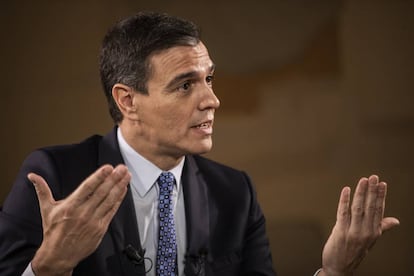Spain’s PM: “The only way to ensure there is a government is to vote for the Socialist Party”
In an interview with EL PAÍS, Spain’s caretaker prime minister discusses Monday’s debate and what deals he is prepared to make if he does not win an absolute majority at the November 10 election

The leader of the Socialist Party (PSOE) and Spain’s caretaker prime minister, Pedro Sánchez, 47, is convinced that the upcoming general election on November 10 is not about competing political platforms, but rather an opportunity for the Spanish people to decide with their vote if they want to break the political deadlock that has led the country to its fourth election in as many years.
This is the central idea the prime-ministerial candidate returns to during the interview with EL PAÍS.
Question. Why did you not respond to the leader of Vox, Santiago Abascal, during the televised election debate on Monday?
Answer. In the debate, we saw a passive right against an aggressive and stronger far right. The right has fueled the far right with the pacts they have made together in several regions and in important cities like Madrid. In Europe, the far right is isolated. Here, the far right is given weight.
I propose that if no governing deal is reached in Congress, we let the party with the most votes govern
Q. Does that excuse the leader of the Socialist Party from his duty to respond to Abascal?
A. [The right] are the ones who have made deals with the far right. Vox is a creation of [former Popular Party prime minister José María Aznar] to destabilize [his successor as Popular Party prime minister Mariano] Rajoy, and it has gotten out of control.
Q. There is a famous French presidential debate between Emmanuel Macron and Marine Le Pen, where Macron refutes all of the far-right leader’s claims. Would you not have liked to have done something similar?
A. We have defended a different Spain. Other parties have to put up a firewall against the far right. Not the PSOE, but the right-wing parties.
Q. Your comments that the public prosecutor depends on the government in the case against Carles Puigdemont, the ousted Catalan premier wanted by the Spanish justice system, triggered a strong response from the public prosecutor. Do you respect the independence of the public prosecutor?
A. One has to be humble. I was not clear when I made that statement. My position before and during my time in government has always been to respect the independence of the public prosecutor and the independence of the judges. My commitment is to work so that the Spanish justice system can impartially judge Mr Puigdemont.

Q. It is clear that you are not going to win an absolute majority. Who would you like to make a deal with to be invested as prime minister?
A. I propose that if no governing deal is reached in Congress, we let the party with the most votes govern.The only way to guarantee that there is a government is to vote for the PSOE. Anything else will continue the deadlock.
Q. And how would you achieve a working government?
A. We have been called to vote on November 10 not to respond to the orientation of politics, as Spaniards already did that on April 28 and May 26 by giving the PSOE a majority. Spaniards want a progressive response to their problems. What is at stake now is whether we have a government or not.
Q. But who would you form a majority with? Is Unidas Podemos your preferred party?
A. According to the polls, can the PSOE and Podemos reach an absolute majority? No. So who would you add to this equation? We have governed with 84 lawmakers and we have brought many laws forward. We did not pass the budget because the right and the Catalan pro-independence parties joined forces against it.
Q. But the fact is you were not able to govern.
In Catalonia, we have to leave the judicial path behind and focus on the political path
A. We approved laws. That is governing. In fact, we did things like recover the unemployment subsidy for people over the age of 52, increase the minimum inter-professional salary, and many other things that were achieved with different majorities, including with Unidas Podemos. What’s important is that Spaniards must guarantee there is a government with their vote on November 10. Voting for the PSOE is guaranteeing that there is a government.
Q. What are the three main issues you will have to negotiate a program on?
A. Justice, social harmony and democratic regeneration.
Q. If Unidas Podemos insists on a coalition government, would an alternative for your investiture be the abstention of the Popular Party (PP)?
A. Does anyone know if the pro-independence parties are going to abstain? Are you sure the PP will abstain? It is important to express hope that we can leave this deadlock behind. But we can only leave it if we concentrate the vote on the only possible option for a government, which is the PSOE.
Q. The plan would be an investiture with the abstention of the PP and then to govern with the leftist bloc with the support of pro-independence parties?
A. Let us see first what Spaniards say with their votes on Sunday. What Mr Iglesias is saying indirectly is that he is newly threatening to do what he has done four times before, that is to block the formation of a progressive government led by the PSOE. What we can’t do is try to reach in offices what the voters have denied us at the ballot boxes. Of course we want to govern with progressive values. We have to begin a new stage. In Catalonia, we have to leave the judicial path behind and focus on the political path. And we have to reach strong agreements on the issues that will affect the future of this country, in areas like education, the ecological transition and pensions.
Q. In July, when the possibility of repeat elections was first discussed, did you think you would be heading into an election with the situation in Catalonia being so complicated?
A. I can guarantee you that we expected everything that we have been seeing. We were very aware that the sentence [from the Supreme Court on the Catalan separatist leaders involved with the 2017 breakaway bid] was going to have a political response on the street. And that’s why I said on a number of occasions that it was important for the stability of the country not to rest on pro-independence political parties. And that’s why I asked the PP and Ciudadanos to abstain, to avoid repeat elections.
Q. Will you take responsibility if the election result on Sunday leaves your party with fewer seats than before?
A. I have always assumed my responsibility. But it is quite curious that you are saying to the top political force that it has to assume its responsibility. Should [PP leader Pablo] Casado have to resign 71 times for the 71 seats that his party lost [at the April 28 election]?
This is an edited version of the full interview published in Spanish on Friday by EL PAÍS.
English version by Melissa Kitson.
Tu suscripción se está usando en otro dispositivo
¿Quieres añadir otro usuario a tu suscripción?
Si continúas leyendo en este dispositivo, no se podrá leer en el otro.
FlechaTu suscripción se está usando en otro dispositivo y solo puedes acceder a EL PAÍS desde un dispositivo a la vez.
Si quieres compartir tu cuenta, cambia tu suscripción a la modalidad Premium, así podrás añadir otro usuario. Cada uno accederá con su propia cuenta de email, lo que os permitirá personalizar vuestra experiencia en EL PAÍS.
¿Tienes una suscripción de empresa? Accede aquí para contratar más cuentas.
En el caso de no saber quién está usando tu cuenta, te recomendamos cambiar tu contraseña aquí.
Si decides continuar compartiendo tu cuenta, este mensaje se mostrará en tu dispositivo y en el de la otra persona que está usando tu cuenta de forma indefinida, afectando a tu experiencia de lectura. Puedes consultar aquí los términos y condiciones de la suscripción digital.








































